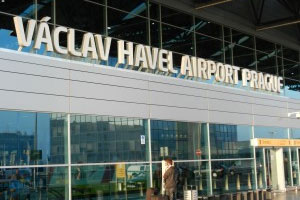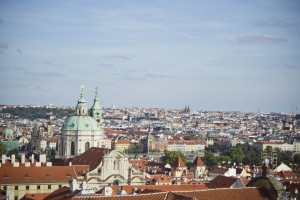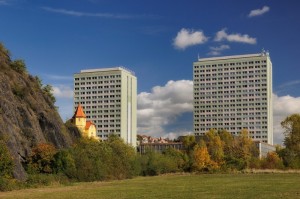Living in Prague
Based on QS Best Student Cities ranking, Prague belongs among the world’s top 50 cities for students.
You will find plenty of resources about living in Prague on the web, as there is a large international community in Prague. Here we give a summary of the basic information relevant to you.
How to get to Prague – coming by air

Prague has a modern and spacious international airport located approximately 17 km (c. 10 miles) northwest of the city center. The airport is named Václav Havel Airport Prague in honor of the first president of the Czech Republic. It handles around 250 flights a day to more than 100 destinations around the world. Some 50 passenger airlines operate at the airport and more than 11 million passengers pass through it every year. Direct flight destinations from Václav Havel Airport Prague include London, Paris, Frankfurt, New York, Seoul, and Dubai, to name but a few.
Visa and Long-Term Residence Permit

International students arriving to study at the Faculty of Mathematics and Physics, Charles University must apply for one of the following:
- A visa for a stay over 90 days (long term) for the purpose of studies (“visa”), or
- A long-term residence permit for the purpose of studies (“residence permit”).
For further information please see the VISA section on our website.
Health Insurance and Medical Care
- Citizens of the European Union with a European Health Insurance Card (EHIC) are entitled to necessary and urgent care. For additional care, they may have to pay or arrange for commercial insurance for foreigners.
- Citizens of other countries: The
Foreign Nationals Residence Act stipulates the obligation for foreign nationals
entering the territory (with the intention of staying more than 90 days) to
have travel insurance covering comprehensive health
care.
This obligation does not apply to foreign nationals covered by Czech public health insurance, or if their health insurance is paid for on the basis of an international agreement (such as Erasmus programmes) or if they hold a valid EHIC or GHIC health insurance card. - For further information on the official requirements of the comprehensive health care insurance see the website of the Ministry of Interior of the Czech Republic.
- The comprehensive insurance can be arranged with different insurance companies. Most commonly used are:
- Further information, including an insurance calculator: InfoCizinci.cz.
Medical Care in the Czech Republic is generally easily accessible. You will receive information from your particular insurance company on contractual medical centres and assistance service telephone numbers. When seeking medical help you call your assistance service number to receive further guidance.
Be prepared that you may have to pay for medical treatment first and then claim it through the insurance company afterwards. Read the insurance contract carefully and its instructions on how to proceed with a claim. Note: Most insurance contracts do not cover psychological or psychiatric help; should this be important to you, ask about this specifically. Although students of Charles University have access to free psychological counselling (allow for a waiting time for an appointment), for additional care or medication prescription (from a psychiatrist) you will need to pay (unless you have advanced health insurance covering such care).
Accommodation and Campus

We offer our students accommodation in a dormitory. Monthly rent ranges from 4900 CZK to 7600 CZK in 2024 (that is approx. 196 – 300 EUR) depending on the quality and type of room.
Reservation of accommodation
If you would like to stay in a Charles University (CU) dormitory, after you receive your acceptance letter inform your Student Advisor that you would like to book a room in a dormitory and the advisor will make the reservation for you. You will be given details for paying a deposit (reservations cannot be made without paying a deposit). Note: New students cannot choose their dormitory but are assigned one. Currently, most of our students stay in the dormitory “Kolej 17. listopadu” in Troja.
Alternatively, you can rent a flat or share a flat with other students. This type of accommodation is arranged by students individually. To look for a flat you might try https://www.bezrealitky.com/ or https://www.expats.cz/praguerealestate.
Housing assistants
In some CU dormitories you can ask for help from a housing assistant. The assistant can help you with practical issues after your arrival or help with communication in case of language barriers. You can contact the assistant in your dormitory before your arrival and make an appointment to meet, or just stay in touch over email.
Campus
Charles University is spread over dozens of different locations in Prague – there is no single campus area. Typically, then, accommodation buildings are located in other parts of Prague than where lectures and classes are held. But no need to worry about travelling around the city as the public transportation system is very efficient. The premises of the Faculty of Mathematics and Physics are at these locations.
For international students classes take place mainly in Troja, walking distance from the Dormitory 17. listopadu, and in Malá Strana (in the very heart of the historical part of Prague), about half an hour by public transport from the Dormitory 17. listopadu. International students will also use the services of the Student Affairs Department located in Karlov.
Changing accommodation
Some students stay in university dormitory accommodation for the first year of their studies and later arrange for individual accommodation. Please note that if you change your address, you must report the change to the relevant authorities. Any change of address must also be reported to the Student Affairs Department and the relevant details updated in the Student Information System.
Food
Student Canteens
There is a network of student canteens (refectories) – in Czech called “MENZA” – where students are entitled to discounts for meals. The average price for a meal is 80–110 CZK (4–5 EUR) for a starter and main course. As a Charles University student, you can use any canteen around the city. The menzas “Právnická” and “Arnošta z Pardubic” are the two nearest to the computer science building in Malá Strana. There is also a menza in Troja.
Cooking for oneself
If you stay in a CU dormitory, you can cook your own meals in the small kitchen corners that are part of the accommodation facility.
Going to a restaurant or having your meal delivered
Many restaurants offer daily lunch menus and take-away meals for reasonable prices. Average lunch menu prices in the centre of the city: Soup: 55–70 CZK, small meal 120–180 CZK, larger meal 180–250 CZK. Coffee: 45–65 CZK. Soft drink: 30–50 CZK (1 EUR = approx. 25 CZK).
You can also use a delivery service (such as Dáme jídlo, Wolt) where you can choose from a variety of restaurants and get your lunch delivered, usually within an hour.
And as for type of the food, every type of international cuisine is offered in Prague – from Italian to Japanese or Mexican. And Czech, of course.
Special dietary needs
In a menza, vegetarian and also some gluten-free meals are offered, and many restaurants have vegetarian, vegan or gluten-free menus. You will find gluten-free or vegan products in supermarkets (such as Billa or Albert) and in specialized stores. Popular ones are Country Life (a chain of specialized shops, restaurants and e-shop), Delmart shops and bistro with a wider offering of bio and vegetarian products, and the chain of popular vegetarian restaurants Dhaba Beas.
Transportation

Prague’s Public transport system is efficient, clean and runs on time (at least most of the time) and you can use it to get all around the city for a reasonable price. The public transport system includes trams (covering the centre of the city and also some suburban areas), a wide network of bus lines (some in the centre but mainly serving suburban areas and residential areas on the outskirts of Prague), three metro lines, one funicular line, and during the summer months also ferries across the Vltava. And just for fun you can take the historical tram line in an old-fashioned tram.
Transport from the airport
If you come to Prague by air, you will arrive at Václav Havel airport (Letiště Václava Havla). Check on the airport’s web site information on how to get from the airport. You can also watch a video by Honest Guide with many practical tips on travel from the airport to the centre of Prague.
If you book your accommodation at a Charles University dormitory, prior to your arrival date you will receive details on how to get from the airport to your dormitory.
Tickets and fares
As a CU student (until the age of 26) you can get a discount on public transport. Until you receive your CU student card, which allows you to get a discounted long-term student ticket, you will need to buy standard fare short-term tickets: https://www.dpp.cz/en/fares/fare-pricelist#1-1
You need to validate your ticket upon entering the transport network (yellow boxes inside of trams and buses and by metro entrances, where you insert the ticket to have it stamped). Once you have a long-term ticket, you do not have to validate it each time you travel; just carry your ticket with you at all times in case there is a ticket check.
Ticket checks: There are occasional ticket checks on the metro, trams and buses when you are asked to present your ticket. Failure to produce a valid ticket incurs a fine of up to 1000 CZK paid on the spot or 1500 CZK in the PID office.
If you are over 26 years of age and are not entitled to a student discount, it is still very convenient to have a long-term ticket: one annual ticket, in Czech “roční kupón”, is 3650 CZK (current price in 2025), which is only 10 CZK per day! You can also buy a quarterly or monthly ticket.
How to get a long-term ticket:
Tickets can be bought in a paper form (a paper card with photograph and long-term ticket, in Czech “kupón”) and you can buy these in any of the pre-sale windows found at almost every metro station. You will need your passport, a photograph, and, if you want a discount, also your CU student (ISIC) card. For the card itself you pay 60 CZK + plus the price of the season ticket (monthly, quarterly or annual). See the up-to-date rates. If you lose the card and/or ticket, you can get a duplicate (60 CZK is charged), but only once. If you lose it again, you need to purchase a new card.
A second option is to obtain an electronic card, known as a „Litacka“. If you lose your „Litacka“ card, you can transfer the „charge“ on it to another card (you just pay a fee for the new “Litacka” card).
A third option is to use your contactless bank card if you register it as an „identifikator“ at the PID office, which can be done through their e-shop. However, there is a lack of information in English about this procedure, so if you want to go this way or have other questions, you can visit one of the INFO CENTRES: https://www.dpp.cz/kontakt/infocentra
Cycling in Prague
There are also cycle routes in Prague. Practical information to help you in planning your bicycle trips are given on the website Praha Cyklistická (in Czech, containing a link to the routefinder “Najdi cestu” Prahou na kole). The way from the student dormitory in Troja, where most of our students live, to the university building in Malá Strana takes about 30 minutes. (The IMPAKT building in Troja where most first-year undergraduate lectures take place is just a few minutes’ walk from the Troja dormitory.)
Travelling out of Prague
In the Czech Republic there are many interesting places worth visiting, so if you decide to take a trip out of Prague, depending on the destination you may depart from one of these stations:
Prague Main
Railway Station (Praha, Hlavní nádraží)
Masarykovo
Station (Praha, Masarykovo nádraží)
Smíchovské Station (Praha,
Smíchovské nádraží)
Florenc Bus Station (Autobusové
nádraží Praha–Florenc); international bus connections start
from here
Safety in the city
Prague is a safe city if you practice common sense (for example, don’t go alone down dark alleys or walk around unlit parks at night). The same goes for the rest of the country. However, it is good to be a bit wary of:
Pickpockets
You should keep an eye on your belongings, especially on public transport, in the city centre area, and in tourist restaurants. Best to keep your bags close by you, with your wallet placed safe inside. Watch out for pickpockets also at railway stations (especially the Main Railway Station) where you may also be approached by beggars (if you wish to give some change, it is safe to do so, but do not take out your wallet out).
Changing money
Never change money on the street and try to avoid changing money at any exchange office. They often have higher rates and hidden charges so you end up getting a lot less than you would at a bank or ATM.
Taxis
There are many online taxi apps. Use these rather than picking up a taxi on the street – unless you are with someone who speaks Czech and knows the city you risk being taken for a ride with fares many times over what you should have paid.
Traffic rules
There may be differences from your home country in how to behave in city traffic to be safe. A few tips for Prague:
Crossing the street – use designed pedestrian crossings (if you are caught by the City Police crossing the street elsewhere, you may be even fined for doing so). If there are traffic lights, respect them.
Never cross the street when a tram is approaching even if there is a pedestrian crossing! The tram has the right of way and has quite a long breaking distance. Several accidents happen each year due to people assessing the situation wrongly.
Be extra careful when crossing tram lines – the second most frequent cause of accidents.
Climate
Moderate with four seasons. In winter, you can get snow and freezing weather as well as quite pleasant days with temperatures above zero, in summer it can be very warm, up to 35 °C (95 °F). The average temperature in January, the coldest winter month, is –5 °C (23 °F), and in July, the warmest summer month, around +23 °C (73 °F).
Student Club
ESN CU Prague is a student club for all CU students (not only those from Erasmus programmes!) which organises various social, cultural and sport events for both international and Czech students, and generally helps international students to handle their stay in Prague. In particular, it organizes Orientation Weeks at the beginning of every semester and regular social and cultural activities, as well as trips during the whole year.



